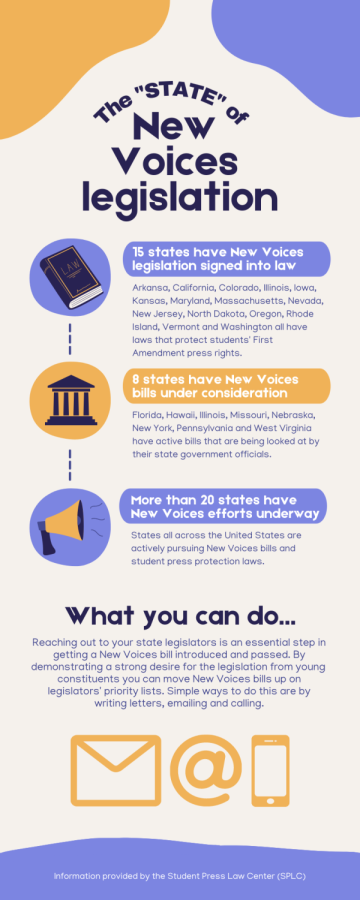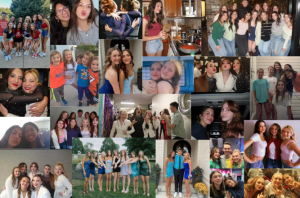A pressing need for legislation
The New Voices law is essential in order to protect student journalists’ rights
Infographic by Kaitlin Reynolds
New Voices laws are in effect in 15/50 states, but they are a necessity in all states in order to protect student journalists and their advisers.
February 7, 2022
As a student journalist, I cover the stories that I think deserve and need to be told. However, whether or not those stories are published and stay published is not at my discretion due to Nebraska’s lack of student press protection laws.
The Student Press Law Center (SPLC), a non-profit organization whose mission is to support and defend the First Amendment and press freedom rights of student journalists and their advisers at the high school and college level, has fought since 1974 to protect student journalists from censorship. Through the SPLC’s New Voices, a student-powered nonpartisan grassroots movement of state-based activists who seek to protect student press freedom with state laws, bills have been passed in 15 states, most recently New Jersey in 2021.
Currently, Nebraska is not included in the states that abide by the legislation and therefore Nebraska’s student journalists and advisers are not protected, but we should be.
New Voices legislation was first introduced into Nebraska’s unicameral legislature by Sen. Adam Morfield in 2019 as LB206. It moved past general file to select file in 2020 and then ultimately was not passed due to a filibuster which timed the bill out, and through a combination of skepticism and COVID-19 cutting the legislative session short, it did not reappear. Morfield reintroduced the bill as LB88 last year which made it farther along in the process; however, the bill died in the select file stage of debate following a vote of 30-17 to overcome a filibuster — just three votes short.
Passing the legislation has been a hesitation for Nebraska’s senators due to the unknown of what students might publish, but the bill continues to uphold that student journalists are not authorized or protected from publishing work that is libelous or slanderous, constitutes an unwarranted invasion of privacy, violates federal or state law or incites students to disrupt the orderly operation of schools. These limits are included to help regulate the content that students can publish so that it is ethical and responsible, but they do not hinder students from publishing vital storytelling.
Morfield, currently serving in his final year of his second term, will be forced to take a four year gap before running for reelection due to term limitations. Without his voice in the legislature to reintroduce the New Voices bill for a third consecutive year the bill will not have the opportunity to cross Gov. Pete Ricketts’ desk unless another senator steps up to introduce the legislation.
While the First Amendment to the U.S. Constitution protects the Five Freedoms of Speech, Religion, Press, Assembly and the Right to Petition the Government; student journalists are not entitled to the same elasticity that professional journalists are allotted, hence the pressing need for the New Voices bill to be introduced and passed.
In 1988, the Supreme Court ruled 5-3 in Hazelwood School District v. Kuhlmeier to uphold the decision of Hazelwood East High School administrators to censor student journalists’ stories concerning teen pregnancy and the effects of divorce on children in their school-sponsored newspaper. This decision ultimately set limits on the First Amendment as it applies to student journalists, which allow for students to be censored by school officials on topics in which they can find a reasonable educational justification for keeping out of school-sponsored publications — a provision so broad that almost anything can be censored.
The Catalyst staff has been fortunate enough to avoid censorship, often publishing articles that speak out about the lack of diversity in our school, the ineffectiveness of our current schedule and other topics unfavorable by administration. Although we are currently in a position where we are not dictated to by administrators, we legally and easily could be, and other student journalists from 35 states including Nebraska are.
According to a survey conducted by the Center for Scholastic Journalism, 42% of students reported having a school official tell them that they were not allowed to publish a piece of journalistic work, and 54% of students said that they are required by their school to let an administrator review their work before publishing. The unfortunate truth is that too many students are having their voices silenced because of the current Supreme Court interpretation of the First Amendment as it relates to student voices.
While ultimately the bill’s introduction into the legislature is at the discretion of Nebraska’s senators, students can act now to improve its odds before it is too late for it to reach the legislative floor. Contacting senators via email, mail and phone to encourage them to support the bill and demonstrate a strong desire for the legislation from young constituents is a simple and key action that will push the New Voices law forward.
Censorship from school officials in student-run publications is a threat to the First Amendment rights of all student journalists, and although the Supreme Court has ruled in favor of suppressing young voices, Nebraska has the power to protect them.







